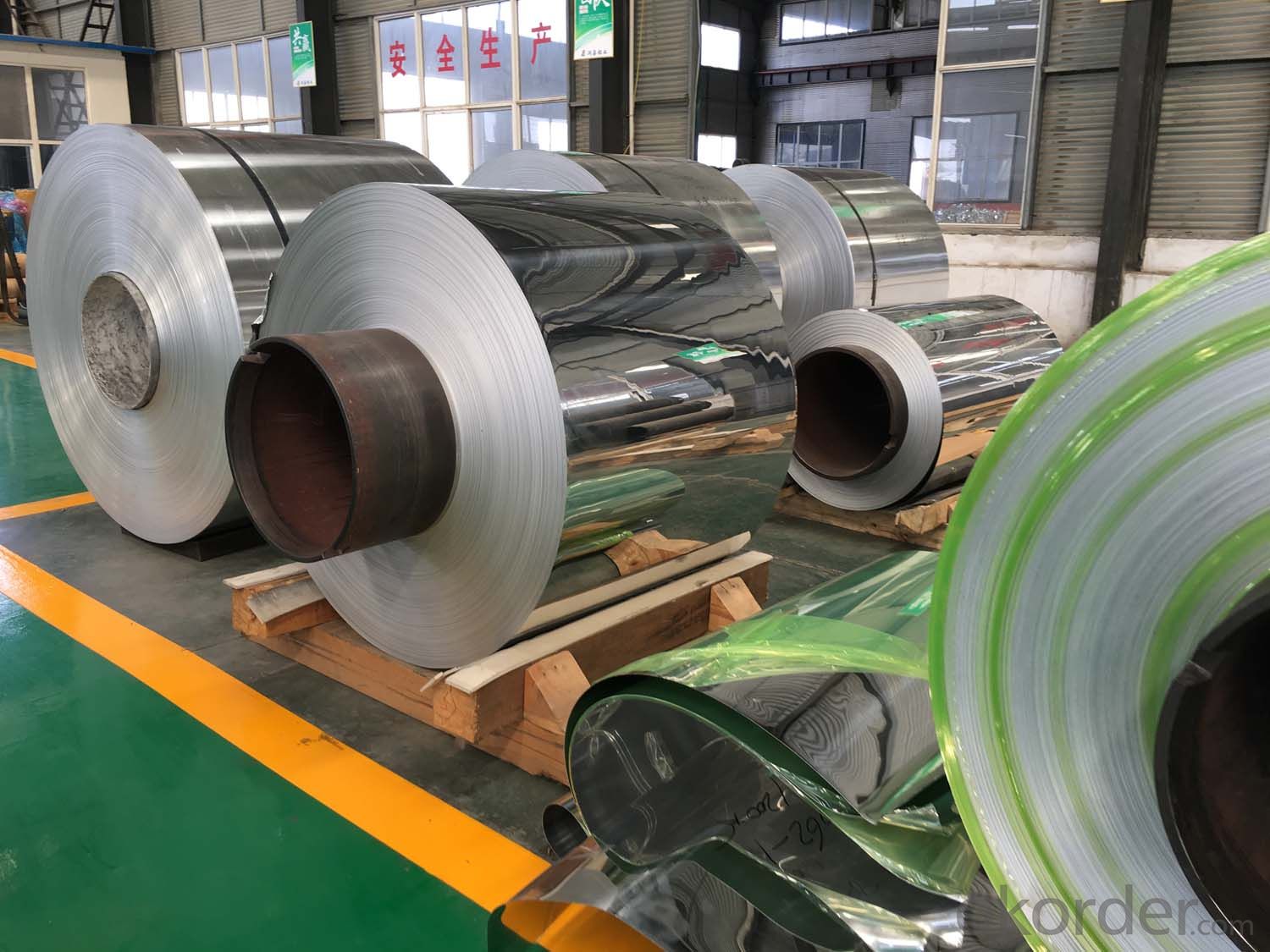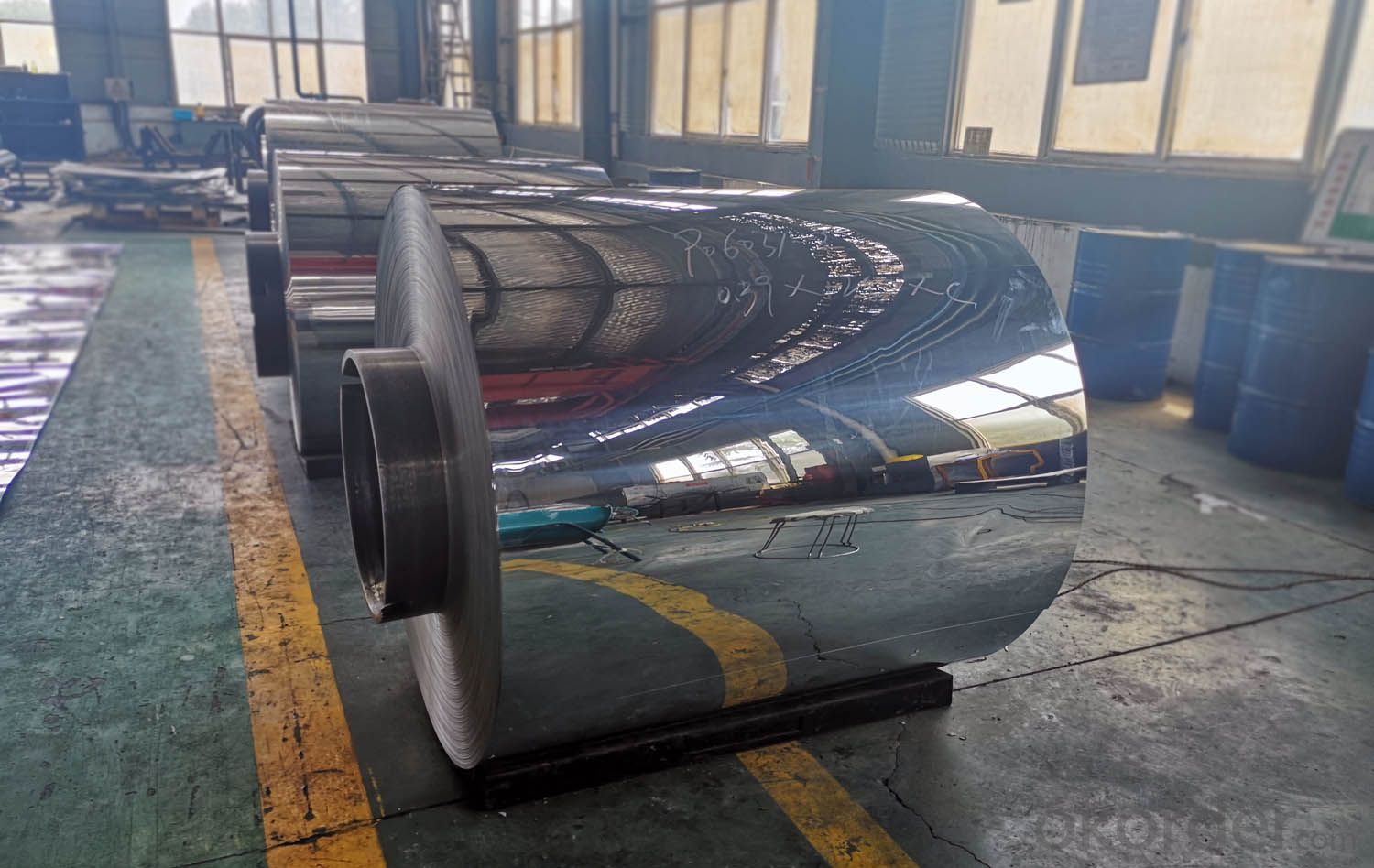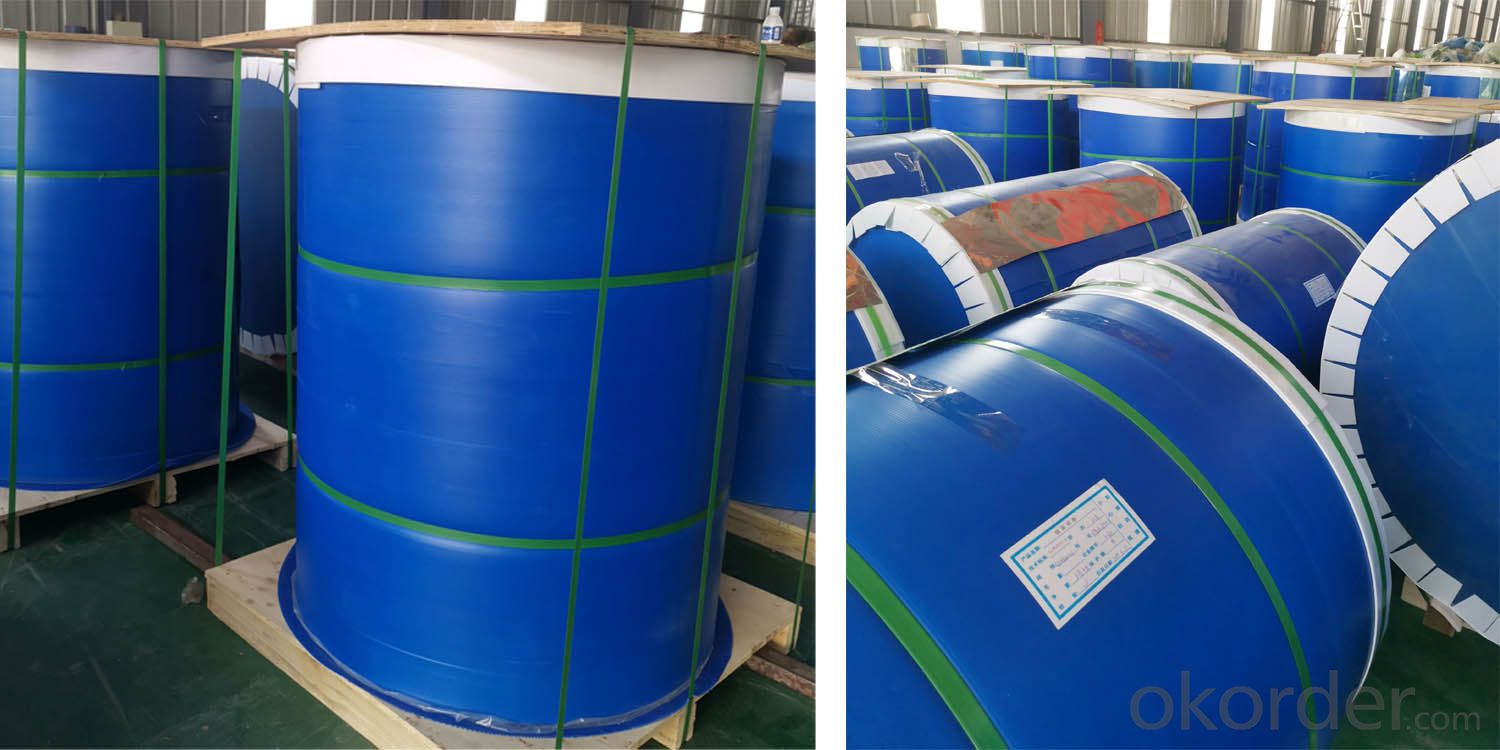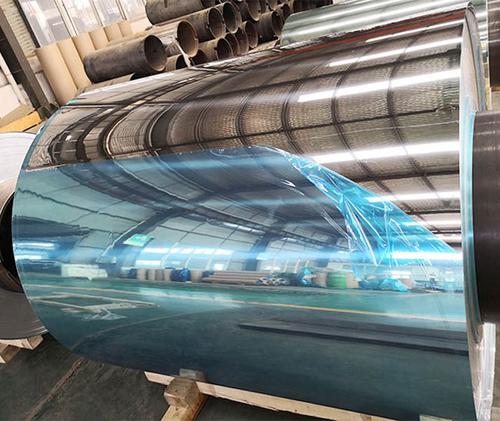Polished aluminum mirror coil for sale 1050 1100 3003 5052 high brightness mirror aluminum coil
- Loading Port:
- Qingdao
- Payment Terms:
- TT OR LC
- Min Order Qty:
- 1 T
- Supply Capability:
- 200 T/month
OKorder Service Pledge
OKorder Financial Service
You Might Also Like
High brightness mirror aluminum coil is a kind of aluminum alloy material treated by special process, with high reflectivity and glossiness on the surface, similar to the effect of mirror. Mirror aluminum coil is more suitable for lamp decoration and electrical panel than ordinary aluminum coil. It is widely used in architectural decoration, lighting equipment, electronic product housing, home appliance manufacturing and decorative parts of transportation vehiHigh brightness mirror aluminum coil is a kind of aluminum alloy material treated by special process, with high reflectivity and glossiness on the surface, similar to the effect of mirror. Mirror aluminum coil is more suitable for lamp decoration and electrical panel than ordinary aluminum coil. It is widely used in architectural decoration, lighting equipment, electronic product housing, home appliance manufacturing and decorative parts of transportation vehicles.
Mirror aluminum coil specifications:
| Alloy | 1050, 1060, 1070, 1085, 1100, 3003, 5052, etc |
| Temper | O - H112 |
| Thickness | 0.1-2.0mm |
| Width | 100-1600mm |
| Length | 100-16000mm |
| Reflectivity | 86 - 93% |
| Color | Silver or RAL color |
| Surface protection | PE/Plastic film covering |
| Application | ACP, lamp, decoration, solar reflector, etc. |
| Packaging | Standard seaworthy export carton. Wooden pallet. Waterproof paper and plastic kraft paper covering. Or as per customer requirements. |
Features:
1. High reflectivity: The surface of mirror aluminum coil can reflect a lot of light, suitable for lamp reflector and solar collector.
2. Good processing performance: It can be processed into various shapes by cutting, stamping, bending, etc.
3. Corrosion resistance: After the surface is oxidized, it has strong corrosion resistance and is suitable for long-term use.
4. Light weight: Aluminum has low density, which reduces the weight of the finished product.
5. Environmental protection: It can be recycled and conforms to the concept of green environmental protection.
Application areas:
1. Lighting reflective materials: such as reflectors and light guide plates of lamps.
2. Architectural decoration: used for wall and ceiling decoration and indoor and outdoor decoration.
3. Home appliance industry: such as decorative parts of TV, refrigerator panels and other electrical appliances.
4. Automobiles and vehicles: used for interior decoration, dashboards and headlight reflectors.
5. Solar energy equipment: as a light reflective material to improve the utilization rate of light energy.



FAQ:
Q1: How can I get a quote from you?
A1: You can leave us a message and we will reply in time.
Q2: Can I visit the factory?
A2: Of course. We warmly welcome you to visit our factory.
Q3: Can I get samples before ordering?
A3: Of course, free samples can be provided, the shipping fee needs to be paid by the buyer, and the postage will be returned after placing the order.
Q4: Do you accept third-party inspection?
A4: Yes, we definitely can accept inspection.
- Q: Pretty please can someone show me the steps on how to do this one?Calculate the mass in grams of iodine (I2) that will react completely with 43.7 g of aluminum (Al) to form aluminum iodide
- easily the guy earlier me did it precise yet made a mistake at one ingredient 0.07 mole is the # of moles of Al which desires to get replaced to moles of product, and then returned to come across mole of iodide. as quickly as thats stumbled on then you quite can use the MW to alter it to grams.
- Q: Are there any limitations to the maximum coil diameter of aluminum coils?
- Yes, there are limitations to the maximum coil diameter of aluminum coils. The maximum coil diameter is determined by several factors including the type and thickness of the aluminum, the equipment used for coiling, and the intended application of the coil. Generally, larger coil diameters can be achieved with thinner and more ductile aluminum alloys. However, as the coil diameter increases, it becomes more challenging to maintain the structural integrity of the coil and prevent deformation, wrinkling, or damage during handling and transportation. Additionally, the equipment used for coiling may have limitations in terms of the maximum diameter it can handle. Therefore, it is important to consider these factors when determining the maximum coil diameter for aluminum coils.
- Q: Are aluminum coils compatible with different welding methods?
- Different welding methods can be used with aluminum coils. Aluminum is a versatile metal that can be welded using techniques like gas tungsten arc welding (GTAW) and gas metal arc welding (GMAW). These methods are commonly used for welding aluminum coils because they produce high-quality welds. GTAW, also known as TIG welding, is particularly suitable for aluminum. It allows for precise control of heat input and produces excellent weld quality. TIG welding uses a non-consumable tungsten electrode and an inert gas like argon to protect the weld zone from contamination. GMAW, also known as MIG welding, is a faster process that uses a consumable wire electrode and a shielding gas to protect the weld pool. It is widely used in industrial applications due to its efficiency and ease of use. In addition to TIG and MIG welding, other methods like laser welding and friction stir welding can also be used for aluminum coils, depending on specific requirements. Proper preparation is crucial for successful welds. Cleaning and surface treatment of the aluminum coils are important to remove contaminants or oxide layers that could affect the welding process. Overall, different welding methods can be used with aluminum coils, and the choice depends on factors like desired weld quality, production requirements, and available skills and equipment.
- Q: What specific conditions or precautions need to be taken into account when storing and transporting steel wires intended for coiling purposes?
- <p>Yes, there are special requirements for storing and transporting steel wires for coiling. These wires must be kept dry to prevent rust and should be stored in a cool, dry place away from direct sunlight or extreme temperatures. They should be handled carefully to avoid kinks or deformations. When transporting, it's important to secure the coils to prevent shifting during transit, which could cause damage. Additionally, the packaging should be robust enough to protect the wires from moisture and physical damage.</p>
- Q: Are there any environmental considerations when using aluminum coils?
- Yes, there are several environmental considerations when using aluminum coils. Firstly, the production of aluminum involves extracting bauxite ore, a process that can result in habitat destruction and soil erosion. Additionally, the extraction and refining of bauxite requires a significant amount of energy, contributing to carbon emissions and climate change. Furthermore, the manufacturing process of aluminum coils involves various chemicals, such as lubricants, coolants, and solvents, which can have adverse effects on the environment if not properly managed. These chemicals can potentially contaminate water sources and harm ecosystems. Moreover, the disposal of aluminum coils at the end of their life cycle can be problematic. While aluminum is highly recyclable and can be melted down and reused, improper disposal can result in aluminum ending up in landfills where it takes hundreds of years to decompose. To mitigate these environmental considerations, it is important to prioritize sustainable sourcing of aluminum, such as opting for recycled aluminum or using suppliers with responsible mining practices. Proper waste management and recycling of aluminum coils at the end of their life cycle are also crucial to reduce environmental impact. Additionally, improving energy efficiency throughout the production process and minimizing the use of harmful chemicals can help to mitigate the environmental footprint of aluminum coil usage.
- Q: What are the typical lead times for ordering aluminum coils?
- Lead times for ordering aluminum coils can vary depending on factors like the supplier, quantity, and market conditions. Typically, lead times can range from a few weeks to several months. For standard aluminum coil sizes and grades that are readily available, lead times are usually shorter and can be fulfilled within a few weeks. This is because suppliers keep inventory for popular products. However, for customized or specialty aluminum coils, lead times tend to be longer. This is because these coils may require specific dimensions, finishes, or alloys that are not readily available. The production process for such coils involves additional steps like casting, rolling, and surface treatments, which can extend the lead time. Market conditions and supplier capacities can also impact lead times. When there is high demand or supply chain disruptions, lead times for aluminum coils may increase. Conversely, during slower periods or when suppliers have excess capacity, lead times may be shorter. To get an accurate estimate of lead times, it is advisable to directly contact aluminum coil suppliers. They will provide specific information based on their current production schedules and inventory levels.
- Q: This question asks whether aluminum coils can be utilized in various forms and dimensions.
- <p>Yes, aluminum coils can be used in different shapes and sizes. They are versatile and can be cut, shaped, or rolled into various forms to suit specific applications. Aluminum's malleability allows it to be easily manipulated, making it suitable for a wide range of industries, including construction, automotive, and packaging. The size of aluminum coils can also vary, from small coils used for crafts to large ones used in industrial applications. The versatility of aluminum coils makes them a popular choice for many different projects and industries.</p>
- Q: I bought some cheap aluminum foil, but one weighs much less than the other brand for the same thickness and length, why?What is the other made of? Is it still good to use for grounding something?Thank you.
- Aluminum foil is aluminum foil, it has nothing but aluminum in it. One of them is misstating the thickness, or you are mistaken about the weight or width.
- Q: Can aluminum coils be used in food processing applications?
- Food processing applications can utilize aluminum coils, as they offer a range of advantages. Aluminum is a widely used and highly adaptable material in the food industry due to its various benefits. Aluminum coils are lightweight, durable, and possess excellent thermal conductivity, which makes them suitable for applications requiring efficient and uniform heat transfer. When it comes to food processing, aluminum coils are commonly employed in equipment such as heat exchangers, evaporators, and refrigeration units. These coils help to cool, heat, or maintain the temperature of different food products during their processing, storage, or transportation. The exceptional thermal conductivity of aluminum ensures that heat is evenly dispersed, thereby aiding in the preservation of food quality and flavor. Furthermore, aluminum is a non-toxic and non-reactive metal, meaning it has no adverse effects on the taste or composition of the processed food. It is also naturally resistant to corrosion, ensuring that the coils do not contaminate the food and can be easily cleaned and maintained. In addition, aluminum is an environmentally friendly and recyclable material, aligning with the increasing demand for sustainable practices in the food industry. Its lightweight nature also contributes to energy efficiency and reduced transportation expenses. In conclusion, aluminum coils are a reliable, efficient, and safe choice for food processing applications. They meet the strict requirements of the industry while ensuring the quality and safety of the processed food.
- Q: Are aluminum coils suitable for architectural sunshades?
- Yes, aluminum coils are suitable for architectural sunshades. Aluminum is a lightweight and durable material that can withstand various weather conditions. It is also corrosion-resistant, making it ideal for outdoor applications. Additionally, aluminum coils can be easily formed and shaped to create customized designs for sunshades, providing both functionality and aesthetic appeal.
Send your message to us
Polished aluminum mirror coil for sale 1050 1100 3003 5052 high brightness mirror aluminum coil
- Loading Port:
- Qingdao
- Payment Terms:
- TT OR LC
- Min Order Qty:
- 1 T
- Supply Capability:
- 200 T/month
OKorder Service Pledge
OKorder Financial Service
Similar products
Hot products
Related keywords


























